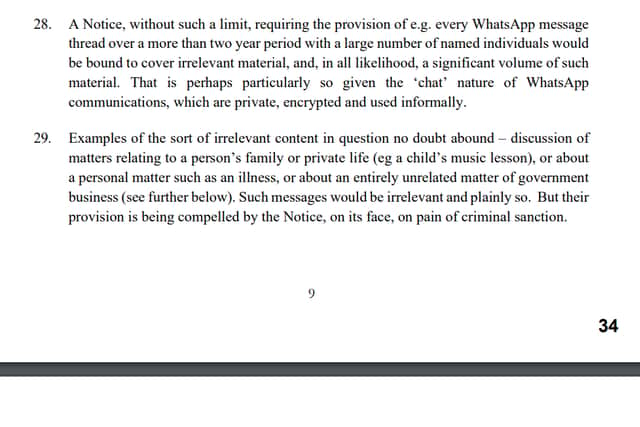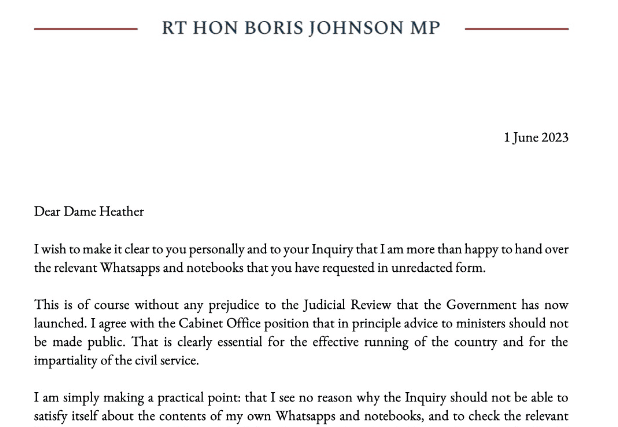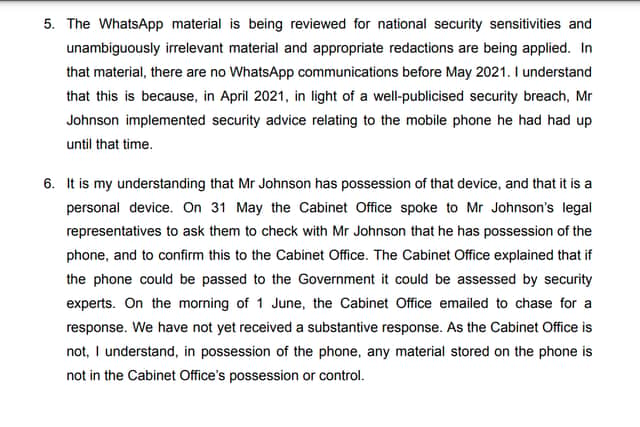Covid inquiry: here are five new things we’ve learned about the Boris Johnson WhatsApp row
and live on Freeview channel 276
It’s been confirmed the government is launching a legal challenge to try to stop the Covid-19 public inquiry accessing Boris Johnson’s unedited WhatsApp messages and handwritten notebooks from his time in Downing Street.
Following the announcement last night (1 June) several important documents were released, giving us more detail about the court battles to come, while we heard from a government minister for the first time about the decision. Here are the five things you need to know:
1. Why the Cabinet Office is taking this action
Advertisement
Hide AdAdvertisement
Hide AdThe Cabinet Office - the department responsible for the running of government - has written to the inquiry chair Baroness Hallett, explaining in more detail why it will ask a court to decide if her request to see all the WhatsApps and notebooks is valid.
It said there were “important issues of principle at stake” - claiming that Hallett had gone beyond her powers by demanding to look at “unambiguously irrelevant material” which “represents an unwarranted intrusion into other aspects of the work of government.”
In a separate statement, the Cabinet Office said the request intruded on people’s right to privacy - because there was no need for the inquiry to see conversations about someone’s family or private life.


2. The government expects to lose the legal fight
Government minister George Freeman predicts the Cabinet Office will lose the legal battle - but insists it’s worth going to court so “the rules are made clear”.
Advertisement
Hide AdAdvertisement
Hide AdSpeaking on BBC One’s Question Time last night, he said: “I happen to think the courts will probably take the view that Baroness Hallett is perfectly entitled and empowered to decide whatever she wants”.
He dismissed suggestions the legal fight was a “cynical waste of time” - and said it would “give people confidence, even if all this achieves is to make very clear that the inquiry will treat with absolute confidentiality anything private and we can get on with it”.
3. Johnson is now giving the inquiry some of the material himself
The former Prime Minister has sent his own letters to Hallett, saying he will hand over the WhatsApps he has “in unredacted form”.
In the first letter, he agrees with the Cabinet Office that - in principle - “advice to ministers should not be made public”. But he adds there’s “no reason” in this case the inquiry shouldn’t see the material in question.


Advertisement
Hide AdAdvertisement
Hide AdIn the second, Johnson says he will also now ask the Cabinet Office to pass on his notebooks - which he gave up earlier this week. He adds he’ll ask for them back if the government chooses not to.
4. Some of Johnson’s WhatsApps are missing
These documents show the messages given by Johnson to the Cabinet Office only go back as far as May 2021 - 14 months after the pandemic began. In April that year, it emerged that the former Prime Minister’s phone number had been publicly available online for 15 years. Johnson changed handsets, and hasn’t used his old phone since for security reasons.
In a witness statement, senior civil servant Ellie Nicholson says the Cabinet Office has asked for the old phone but hasn’t had a “substantive response” from Johnson’s legal team.


Johnson’s spokesman denies this - saying he’s asked the Cabinet Office whether “security and technical support can be given so that content can be retrieved without compromising security”.
5. 150 questions for the ex-PM
Advertisement
Hide AdAdvertisement
Hide AdThe Covid inquiry has also sent Johnson a list of 150 questions to answer. They include:
- Whether he suggested to his advisers in March 2020 that he could be injected with Covid on TV “to demonstrate to the public that it did not pose a threat”
- If, in autumn 2020, he said he’d rather “let the bodies pile high” than order another lockdown
- Whether he received advice from the Cabinet Secretary that the Health Secretary at the time - Matt Hancock - “should be removed from his position”
What happens next?
We’re expecting to get more details about the next steps in the legal challenge when the Covid inquiry holds its next preliminary hearing on Tuesday (6 June).
Comment Guidelines
National World encourages reader discussion on our stories. User feedback, insights and back-and-forth exchanges add a rich layer of context to reporting. Please review our Community Guidelines before commenting.
